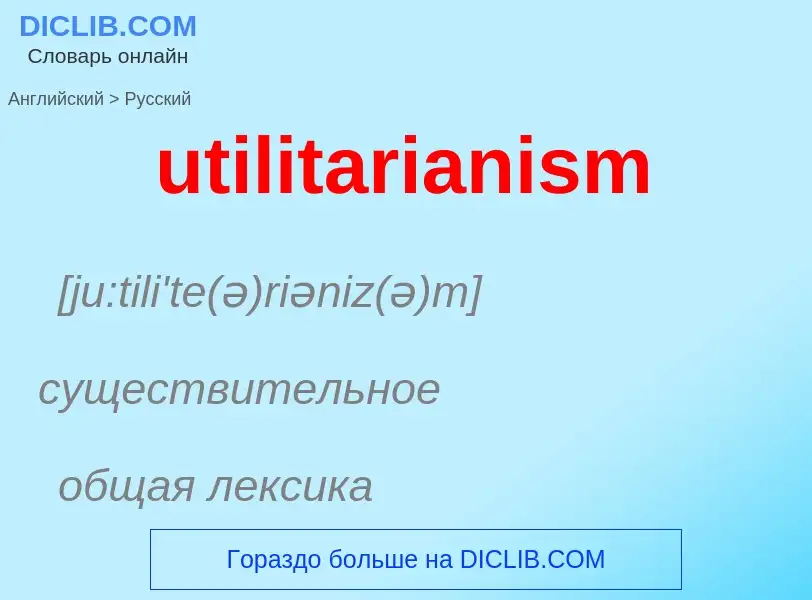Vertaling en analyse van woorden door kunstmatige intelligentie ChatGPT
Op deze pagina kunt u een gedetailleerde analyse krijgen van een woord of zin, geproduceerd met behulp van de beste kunstmatige intelligentietechnologie tot nu toe:
- hoe het woord wordt gebruikt
- gebruiksfrequentie
- het wordt vaker gebruikt in mondelinge of schriftelijke toespraken
- opties voor woordvertaling
- Gebruiksvoorbeelden (meerdere zinnen met vertaling)
- etymologie
utilitarianism - vertaling naar russisch
[ju:tili'te(ə)riəniz(ə)m]
существительное
общая лексика
утилитаризм
прагматизм
Definitie
Wikipedia
In ethical philosophy, utilitarianism is a family of normative ethical theories that prescribe actions that maximize happiness and well-being for all affected individuals.
Although different varieties of utilitarianism admit different characterizations, the basic idea behind all of them is, in some sense, to maximize utility, which is often defined in terms of well-being or related concepts. For instance, Jeremy Bentham, the founder of utilitarianism, described utility as:
That property in any object, whereby it tends to produce benefit, advantage, pleasure, good, or happiness ... [or] to prevent the happening of mischief, pain, evil, or unhappiness to the party whose interest is considered.
Utilitarianism is a version of consequentialism, which states that the consequences of any action are the only standard of right and wrong. Unlike other forms of consequentialism, such as egoism and altruism, utilitarianism considers the interests of humans equally. Proponents of utilitarianism have disagreed on a number of issues, such as whether actions should be chosen based on their likely results (act utilitarianism), or whether agents should conform to rules that maximize utility (rule utilitarianism). There is also disagreement as to whether total utility (total utilitarianism), average utility (average utilitarianism) or the utility of the people worst-off should be maximized.
Though the seeds of the theory can be found in the hedonists Aristippus and Epicurus, who viewed happiness as the only good, and in the work of the medieval Indian philosopher Śāntideva, the tradition of modern utilitarianism began with Jeremy Bentham, and continued with such philosophers as John Stuart Mill, Henry Sidgwick, R. M. Hare, and Peter Singer. The concept has been applied towards social welfare economics, questions of justice, the crisis of global poverty, the ethics of raising animals for food, and the importance of avoiding existential risks to humanity.

![[[Jeremy Bentham]] [[Jeremy Bentham]]](https://commons.wikimedia.org/wiki/Special:FilePath/Jeremy Bentham by Henry William Pickersgill detail.jpg?width=200)
![''Modern Utilitarianism'' by [[Thomas Rawson Birks]] 1874 ''Modern Utilitarianism'' by [[Thomas Rawson Birks]] 1874](https://commons.wikimedia.org/wiki/Special:FilePath/Modern Utiitarianism by Birks.png?width=200)
![[[Peter Singer]] [[Peter Singer]]](https://commons.wikimedia.org/wiki/Special:FilePath/Peter Singer MIT Veritas.jpg?width=200)
